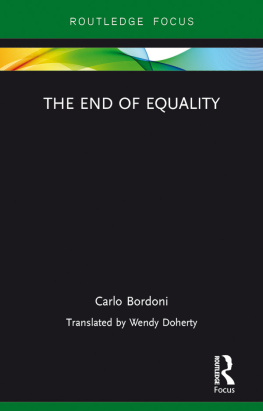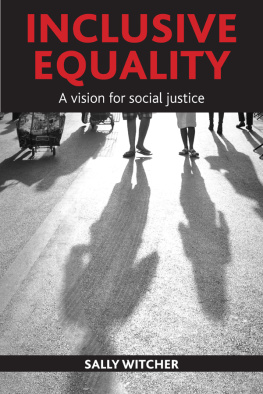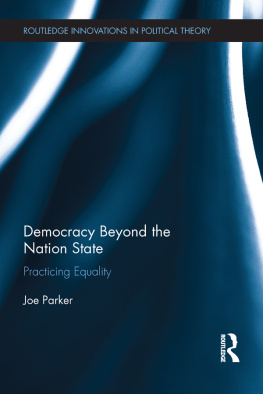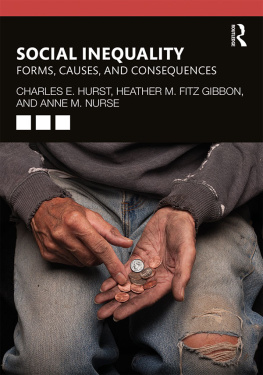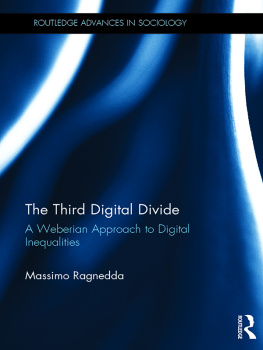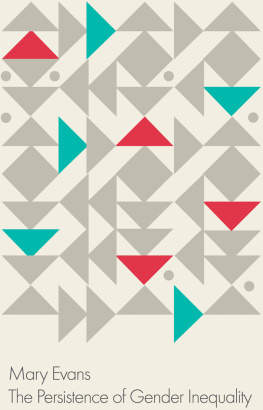Bordoni - The End of Equality
Here you can read online Bordoni - The End of Equality full text of the book (entire story) in english for free. Download pdf and epub, get meaning, cover and reviews about this ebook. City: Abingdon;Oxon;New York;NY, year: 2017, publisher: Routledge, genre: Politics. Description of the work, (preface) as well as reviews are available. Best literature library LitArk.com created for fans of good reading and offers a wide selection of genres:
Romance novel
Science fiction
Adventure
Detective
Science
History
Home and family
Prose
Art
Politics
Computer
Non-fiction
Religion
Business
Children
Humor
Choose a favorite category and find really read worthwhile books. Enjoy immersion in the world of imagination, feel the emotions of the characters or learn something new for yourself, make an fascinating discovery.
The End of Equality: summary, description and annotation
We offer to read an annotation, description, summary or preface (depends on what the author of the book "The End of Equality" wrote himself). If you haven't found the necessary information about the book — write in the comments, we will try to find it.
The End of Equality — read online for free the complete book (whole text) full work
Below is the text of the book, divided by pages. System saving the place of the last page read, allows you to conveniently read the book "The End of Equality" online for free, without having to search again every time where you left off. Put a bookmark, and you can go to the page where you finished reading at any time.
Font size:
Interval:
Bookmark:

The economic crisis has brought social differences to the fore, reinventing the old question of inequality as democracys missed opportunity. Many have attempted to find a rational explanation of the problem, tracing it back to poor economic policy and reckless liberalisation of finance, or the crisis of banks and governments, as well as the collapse of family relationships. At the same time, globalisation has reduced the differences between some nations, bringing emerging countries to the level of the more advanced, but has dangerously increased internal inequalities. In this book, the author examines the question of inequality and the social problems it is creating in societies across the world, arguing that with the crisis of modernity, the ideal of equality appears to be over. As more and more of the worlds resources are concentrated in ever fewer hands, this book asks whether the end of mass society will coincide with the end of equality and a re-evaluation of the worth of the individual. Are we heading towards a liquid world in which being equal is now considered less a virtue than a weakness?
Carlo Bordoni is a sociologist and journalist, former lecturer at the University of Florence and Director of the Academy of Fine Arts, Italy. He writes for the Italian newspaper Il Corriere della Sera and its literary supplement, La Lettura; for the quarterly Prometeo and for the journal Social Europe on-line. He is the author of Interregnum: Beyond Liquid Modernity, and the co-author, with Zygmunt Bauman, of State of Crisis.
Carlo Bordoni
Translated by Wendy Doherty

First published 2017
by Routledge
2 Park Square, Milton Park, Abingdon, Oxon OX14 4RN
and by Routledge
711 Third Avenue, New York, NY 10017
Routledge is an imprint of the Taylor & Francis Group, an informa business
2017 Carlo Bordoni
The right of Carlo Bordoni to be identified as author of this work has been asserted by him in accordance with sections 77 and 78 of the Copyright, Designs and Patents Act 1988.
All rights reserved. No part of this book may be reprinted or reproduced or utilised in any form or by any electronic, mechanical, or other means, now known or hereafter invented, including photocopying and recording, or in any information storage or retrieval system, without permission in writing from the publishers.
Trademark notice: Product or corporate names may be trademarks or registered trademarks, and are used only for identification and explanation without intent to infringe.
British Library Cataloguing in Publication Data
A catalogue record for this book is available from the British Library
Library of Congress Cataloging-in-Publication Data
A catalog record for this book has been requested
ISBN: 978-1-138-20491-1 (hbk)
ISBN: 978-1-315-46729-0 (ebk)
Typeset in Times New Roman
by Apex CoVantage, LLC
The peculiar and preponderant fact that marks those ages as its own is the equality of condition; the ruling passion of men in those periods is the love of this equality. Do not ask what singular charm the men of democratic ages find in being equal, or what special reasons they may have for clinging so tenaciously to equality rather than to the other advantages that society holds out to them: equality is the distinguishing characteristic of the age they live in; that of itself is enough to explain that they prefer it to all the rest.
Alexis De Tocqueville
We are all born different and then search for equality. The social drive towards uniformity is so strong that it suppresses our primordial instinct to stand out, to the point of making us feel a sense of inferiority if our diversity is not hidden, subdued, even annihilated. Being the same becomes a primary objective, a model to pursue, because it makes us feel at ease in the community and with ourselves; it gives us a sense of security and helps keep other peoples criticism at bay. It is a sort of calming passiveness and allows us, in the event, to be on the other side and criticise those who stand out from the crowd.
Perhaps the first social fear that human beings encounter in their life is the fear of their own inadequacy; that their own diversity, their uniqueness, their personal characteristics, which they perceive as flaws, are recognised by the others and derided, thus becoming a target for criticism and marginalisation. Education induces us to want to become like other people, presenting as the first and most concrete form of social repression, which, of course, is necessary in order to contain the many differences that coexist in the same social context.
We are all equal is an apparently incontrovertible statement, which has become accustomed to through education, culture, ethics and reason, an axiom that, by definition, does not need to be proven. To call the validity of this into question exposes us to considerable risks, primarily to charges of racism, the most hateful of accusations, and then, in turn, of fascism, anti-democracy, traditionalism, and stupidity.
The assertion of equality is an unquestionable principle that is the basis of all forms of coexistence, of every law and every political system that refers to democracy. And yet we only have to take a look at any street, at any time, in any city on this planet, and what we see systematically and repeatedly contradicts such a resolute statement.
Inequality is perceptible; its proven and palpable in real everyday life, even though, in theory, it does not exist.
What causes this jarring contradiction? Hypocrisy, bad faith, cynicism? Or more simply, a historical misunderstanding, a kind of original sin determined by the foundations of modernity, that the Enlightenment believed it could impose through an act of presumption and rational optimism, but which three centuries of modernity have not been able to put in practice. The failure to achieve equality among men is the most serious of the promises that modernity has fallen short of, and perhaps it is the most difficult to keep.
Modernity does not go beyond the formal principle of equality, according to which all men are equal in the eyes of the law and enjoy the same rights, regardless of sex, social class, origins, religious and political beliefs. Embraced by the French Revolution, the recognition of formal equality has not proven conclusive, eluding that absolute principle of rationality on which it was founded and lacking in practical application, if it is not followed by real political, economic and social equality.
With regard to this, the Enlightenment has fundamental responsibilities. Freed from religious influence, the Enlightenment thinkers believe that the only way man could improve himself is through reason: a continuous process towards perfection which can only be achieved through knowledge. Progress is the new faith and takes on a universal meaning that encapsulates and carries along in its wake everything positive that can help to achieve human happiness.
From John Lockes theory of sensationalism, according to which all our ideas are derived from the senses, Voltaire and Condillac develop an idea of moral pragmatism that comes close to David Hume and Jeremy Benthams utilitarianism: all that is useful to man is good and right. The ethical principles of the Enlightenment are ready to meet the interests of capitalism, by introducing to the modern idea of progress the principle of utility and cost effectiveness that will carry on into the following centuries: if wealth is useful, then it is morally justified to pursue it as an ideal of life. This principle has significant similarities with the sixteenth-century Calvinist reform of Luther, and as Max Weber points out, the development of modern capitalism is connected to it.
Font size:
Interval:
Bookmark:
Similar books «The End of Equality»
Look at similar books to The End of Equality. We have selected literature similar in name and meaning in the hope of providing readers with more options to find new, interesting, not yet read works.
Discussion, reviews of the book The End of Equality and just readers' own opinions. Leave your comments, write what you think about the work, its meaning or the main characters. Specify what exactly you liked and what you didn't like, and why you think so.

